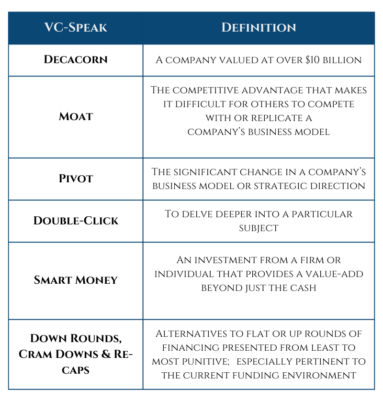By Bill Beyer
As a Fractional CFO for multiple venture-backed companies (typically three at a time), I am often asked where I spend most of my time. Although my duties and contributions vary, the answer is: (i) fundraising; both debt and equity, (ii) investor relations, and (iii) planning; both strategic and operating plans.
You may find (ii) curious given that I’m working with private companies that don’t require the dedicated IR function of a public company to communicate with the Street, respond to investors, and adhere to Reg FD, among other responsibilities.
I spend significant time on investor relations because I’m often working with first-time CEOs and coaching Controllers and VPs of Finance who aspire to take on the CFO role. At this point in their careers, none of them are necessarily equipped with the soft skills required to effectively communicate with their syndicates and broader stakeholders.
This article explores the critical soft skills an Executive must possess with a focus on communicating in a venture-backed environment.
Be Mindful of These Critical Stages in Your Career
A wise person and former colleague once relayed to me the following three stages of one’s career:
Stage 1 – You get paid for what you do. This is the staff level of many companies. You learn a task and then continue to complete that task.
Stage 2 – You get paid for what you know. This is the manager or director level of many companies. You learned a series of tasks well enough to train and manage others to complete those tasks.
Stage 3 – You get paid for who you are. Congratulations, you have ascended to a company’s VP- or C-level. Among other qualities, your communication skills and how you carry yourself inspire the confidence of others in you. Presumably, you have developed some of the essential soft skills of an Executive.
The brilliance of this notion is in its simplicity.
What exactly are executive soft skills?
What are soft skills? Soft skills are a set of personal attributes and abilities that allow individuals to interact effectively with others in a professional setting. Contrasting “hard” or technical skills (i.e. job-specific and measurable), soft skills are more related to “who you are” and are more difficult to measure. Soft skills include communication, critical thinking, leadership, intuitive intelligence, and emotional intelligence, among others. Picking the most important soft skill is difficult; however, most organizations value communication more.
Fortunately, soft skills can be learned. Many organizational learning programs develop soft skills through coaching, training, and leadership development. Focusing on communications in a venture-backed environment, developing that soft skill is further complicated by “VC-speak,” or (euphemistically) learning an entirely new language.
Decoding VC-Speak
VC-speak refers to the phrases and jargon generally used by venture capitalists when
discussing startups, investments, and business overall. Buzzwords specific to venture capital and a style that is opaque in nature are characteristics of VC-speak. Effectively navigating conversations with investors requires an understanding of VC-speak.
In addition to the basics (Pre, Post, runway, etc.), VC-speak includes but is certainly not limited to the following:

Soft skills and fluency in VC-speak are all the more important in challenging funding markets. The ability to translate and analyze the finer details of, for example, down rounds, cram downs, and re-caps coupled with communication soft skills enables focused and effective negotiations of the term sheets in hand, identifying alternative funding options and attracting competing proposals in an effort to minimize the downside of the current environment.
Developing Soft Skills
From personal experience, I developed soft communication skills, including fluency in VC-speak, through a combination of coaching, listening, and observing. As a 35-year-old, first-time CFO, I was dropped into the chair without the full arsenal of soft skills and fundraising experience. I immediately enlisted a mentor; the CFO that I last worked with. We met quarterly over dinner. Those two hours had the highest ROI for me each quarter. I was able to ask questions like:
“An investor told me… ‘we love what you’re doing, but you need to hit your next milestone…’ they’re going to invest, right?”
To which, I received the following response from my coach:
“No, that’s a pass.”
The phrase or basis of my question could be replaced with:
“We think you’re on the right track, but it’s a little early for us right now. Let’s stay in touch.”
“This is a fascinating space, but we’re focusing on different sectors at the moment.”
or,
“We think you’re building something interesting, but we need to see more traction before we can commit.”
The above dialogue exemplifies the opaque nature of what investors communicate. My mentor helped definitionally with VC-speak and with some of the nuances. The balance was developed by listening and observing. That first CFO role was with a start-up backed by some of the leading Sand Hill Road funds. Every visit to their respective offices and every board meeting offered opportunities for me to listen and observe. I observed an investor’s reaction to what was communicated, whether that reaction was positive, negative, or indifferent. All of the above accelerated my climb up the soft skill learning curve.
…
Soft skills are not just a nice-to-have; they are a critical differentiator for executives, especially in the fast-paced world of venture-backed companies. Whether you’re a first-time CFO, an aspiring finance leader, or a CEO navigating investor relations, developing these skills will help you communicate more effectively, build stronger relationships, and drive better outcomes for your organization. The ability to decode VC-speak, adapt your communication style, and understand the nuances of investor feedback can significantly impact your success.
At FLG Partners, we understand the challenges that come with executive roles in high-growth companies. Our coaching and mentoring services are designed to help you accelerate your development and master the soft skills needed to thrive at every stage of your career.
Reach out to us to learn how we can support your growth to getting paid for who you are.



